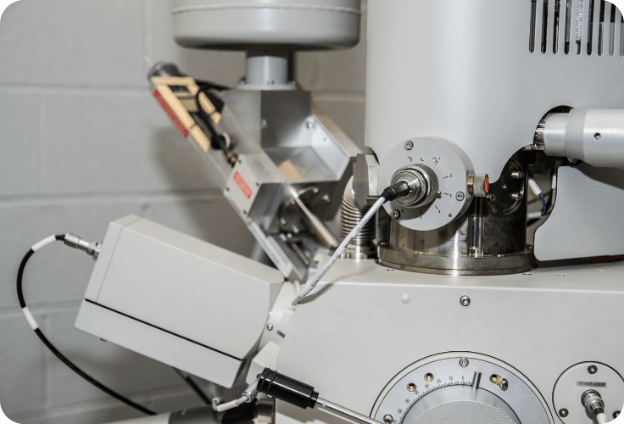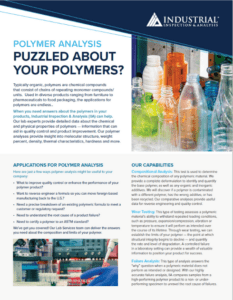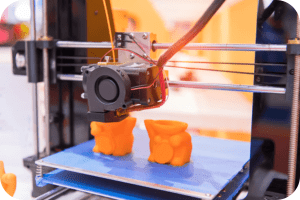Puzzled about your polymers?Polymer Analysis
Typically organic, polymers are chemical compounds that consist of chains of repeating monomer compounds/units. Used in diverse products ranging from furniture to pharmaceuticals to food packaging, the applications for polymers are endless.
When you need answers about the polymers in your products, Industrial Inspection & Analysis (IIA) can help. Our lab experts provide detailed data about the chemical and physical properties of polymers — information that can aid in quality control and product improvement. Our polymer analyses provide insight into molecular structure, weight percent, density, thermal characteristics, hardness and more.
Want to know the melt flow rate of a thermoplastic material? Want to improve quality control or enhance the performance of your polymer product? Want to reverse engineer a formula so you can move foreign-based manufacturing back to the U.S.? Need a precise breakdown of an existing polymeric formula to meet a customer or regulatory request? Need to understand the root cause of a product failure? Need to certify a polymer to an ASTM standard?
We’ve got you covered! Our Lab Services team can deliver the answers you need about the composition and limits of your polymer.
Applications for Polymer Analysis
Here are just a few ways polymer analysis might be useful to your company:We’ve got you covered! Our Lab Services team can deliver the answers you need about the composition and limits of your polymer.
Talk To An Expert
Don’t see exactly what you are looking for? Or maybe you do and want more specifics or an estimate. Either way, you can call us at
470-552-8301
right now or just fill out the form below and we will respond back within 24 hours.
Our Capabilities
- COMPOSITIONAL ANALYSIS: This test is used to determine the chemical composition of any polymeric material. We provide a complete deformulation to identify and quantify the base polymer, as well as any organic and inorganic additives. We will discover if a polymer is contaminated with a different polymer, has the wrong additive, or has been recycled. Our comparative analyses provide useful data for reverse engineering and quality control.
- WEAR TESTING: This type of testing assesses a polymeric material’s ability to withstand repeated loading conditions, such as pressure, expansion/compression, vibration or temperature to ensure it will perform as intended over the course of its lifetime. Through wear testing, we can establish the limits of your polymer — the point at which structural integrity begins to decline — and quantify the rate and level of degradation. A controlled failure in a laboratory setting can provide a wealth of valuable information to position your product for success.
- FAILURE ANALYSIS: This type of analysis answers the “why” question when a polymeric material does not perform as intended or designed. With our highly accurate failure analysis, IIA compares samples from a high-performing polymer product to a non- or under-performing specimen to unravel the root cause of failures.
Why Choose IIA?
With roots that date back nearly a century, IIA has grown to become one of the largest and most trusted providers of lab services in North America. Our ISO-accredited testing lab provides timely, accurate results, using a wide variety of test equipment and experienced personnel. Our capabilities include metallurgical, non-destructive, dimensional, mechanical, EMC/EMI, consumer goods, calibration, environmental and chemical analysis. As a full-service provider, the entire IIA team is on tap to help resolve questions or issues related to your polymer analysis.
Instrumentation & Types of Data Delivered
Pyrolysis Gas Chromatography (Py/GC)
- Polymer & Additive Identification
- Polymer & Additive Degradation Times [Evolved Gas Analysis (EGA)]
- Product Comparison
Differential Scanning Calorimetry (DSC)
- Enthalpy of Melting
- Enthalpy of Crystallinity
- Glass Transition Temperature
- Morphology Information (Preliminary)
- Oxidative Induction Time (Time between melting point and onset of degradation)
Thermogravimetric Analysis (TGA)
- Plasticizer Content
- Polymer Content
- Carbon Black
- Ash
- Thermal Stability (Determines temperature at which a component starts to break down)
Energy-Dispersive X-Ray Spectroscopy (EDS)
- Elemental Analysis
Scanning Electron Microscope (SEM)
- Surface Analysis
Infrared (IR) Spectroscopy
- Structural Information
Other Polymer Testing Services
- Density
- Hardness
- Shore A (for rubbers)
- Shore D (for plastics)
- % Moisture
- Tensile Strength
- IZOD Impact Test
- Flammability
- Dielectric Constants
- Solubility
- Thermal Behavior
- Thermoplastic vs. Thermoset
- Litmus Tests of Vapors from Plastics
- Impact Resistance
- Melt Flow Indexing

Resources



